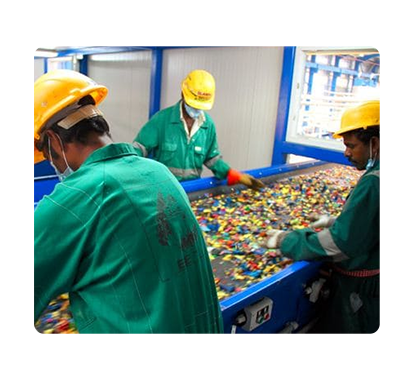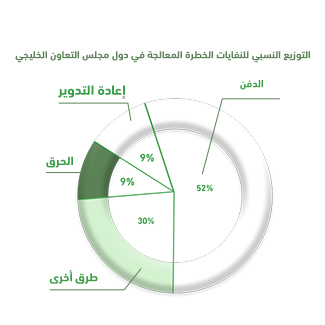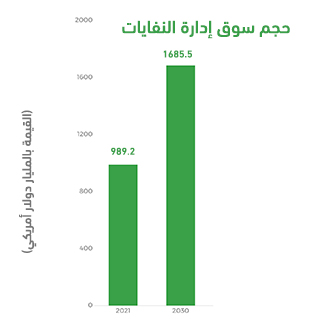The Recycling Sector in the Gulf Cooperation Council (GCC) Countries
Technological advancements in the Gulf Cooperation Council (GCC) countries, along with population growth, have led to an increase in the volume of waste generated from human, industrial, and other activities. This growing waste problem has posed a real challenge for GCC governments, requiring them to act swiftly to mitigate environmental and health risks. The total collected waste (both hazardous and non-hazardous) in GCC countries is estimated at approximately 131.8 million tons, with 1.2% classified as hazardous waste and 98.8% as non-hazardous waste.
Key Indicators of the Recycling Sector in the GCC:
- The total collected hazardous waste in GCC countries amounts to 1.6 million tons.
- The total collected non-hazardous waste in GCC countries amounts to 2 million tons.
- Hazardous waste is categorized as follows: 6% medical waste, 81.8% industrial waste, and 12.2% other waste (such as batteries and electronic waste).
- Non-hazardous waste is categorized as follows: 40.7% construction waste, 25% household waste, 1.7% green waste, and 32.5% other waste.
- 51% (67.2 million tons) of the total collected waste has been processed.
- The total collected industrial waste in GCC countries is 1.3 million tons, with Saudi Arabia and the UAE generating 63.1% and 19.3% of this waste, respectively.
- The total collected non-hazardous household waste in GCC countries is 32 million tons.
- The UAE ranks first in terms of recycled waste, accounting for 42.8% of total processed waste.
- The amount of hazardous waste recycled in GCC countries is 100,000 tons (9.3%) of the total processed hazardous waste.
- Saudi Arabia leads in solid waste production, generating over 16 million tons annually, followed by the UAE with 5.4 million tons annually.
Waste Composition in the Middle East and North Africa (MENA) Region:
- Food and green waste: 58%
- Glass: 3%
- Metals: 3%
- Paper and cardboard: 13%
- Plastic: 12%
- Wood: 1%
- Rubber and leather: 2%
- Other waste: 8%
Waste Treatment in the GCC:
-
Hazardous waste treatment methods:
- Incineration: 9%
- Landfilling: 51.7%
- Recycling: 9.3%
- Other methods: 30%
-
Non-hazardous waste treatment methods:
- Landfilling: 51%
- Other methods (incineration, recycling, etc.): 49%
Benefits of the Circular Economy in GCC Countries:
- Reducing primary energy consumption by approximately 4%.
- Creating 50,000 jobs in the recycling sector.
- Reducing CO₂ emissions by 13 million tons annually.
- Contributing to economic returns of up to USD 138 billion for GCC countries between 2020 and 2030.
Recommendations:
Mashroo3k Consulting recommends investing in the recycling sector due to the following factors:
- Global municipal solid waste production is approximately 2.01 billion tons and is expected to reach 3.40 billion tons by 2050.
- In 2014, global e-waste production reached 12.8 million metric tons, rising to 53.6 million metric tons by 2019.
- Plastic and paper account for approximately 29% of global waste, making them highly profitable sectors for recycling investment.
Below is a breakdown of global waste types and their percentage share of total waste production:





